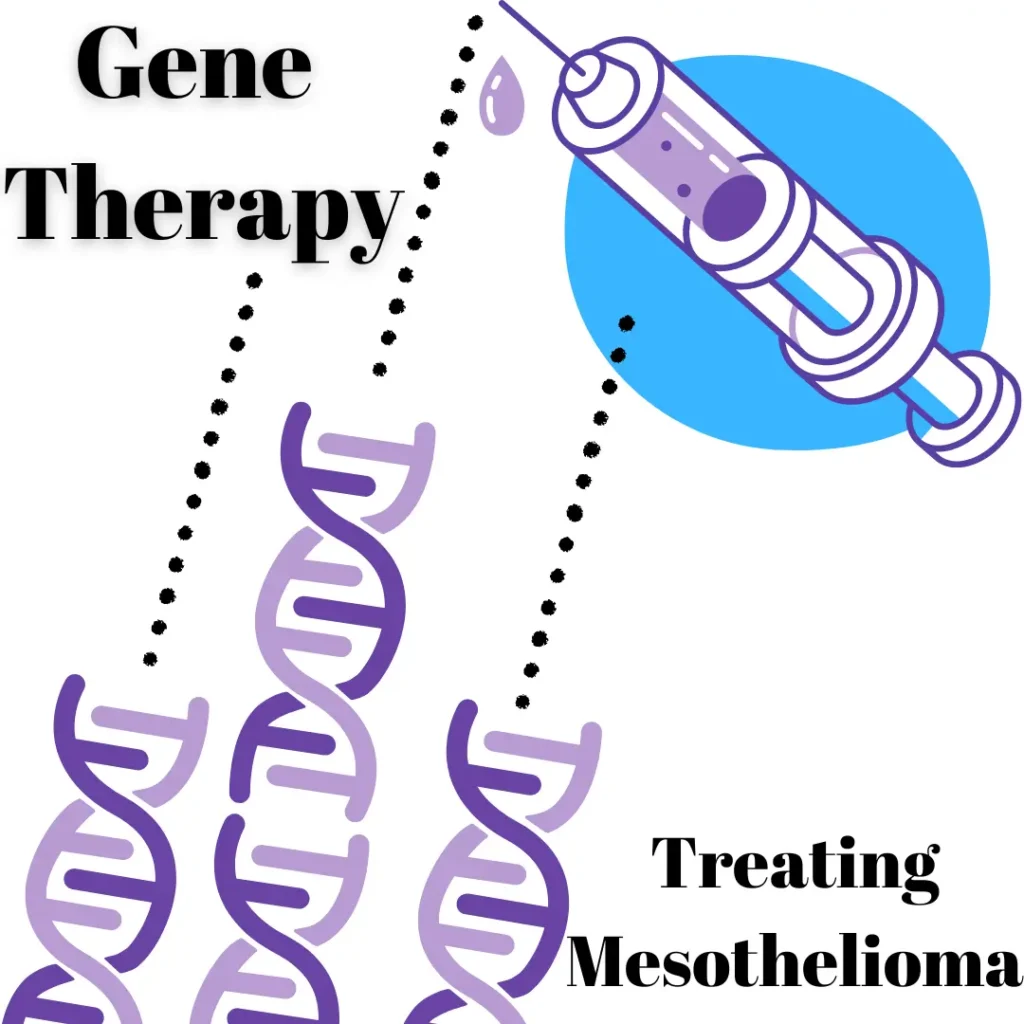Key takeaways: A characteristic of mesothelioma is its genetic mutations, which result in loss
of immune function, a usurping of normal anti tumor capacities, and a weakening of the safety
nets that prevent cells from becoming cancerous. Gene therapy—without modifying
genes—seeks to replace the functions of the mutated genes, either by introducing their products,
introducing healthy segments of the genes, or by modifying the immune system. Gene therapy is
currently only available in clinical trials, but its use will hopefully become more widespread in
the future.

What is Gene Therapy?
Gene therapy seeks to reverse genetic mutations—a characteristic of all cancers—in hopes of
restoring healthy functioning and growth to cancerous cells. In mesothelioma, asbestos fibers
hijack local immunity, reasonable growth patterns, and cells’ gene signatures, or their unique
expression of DNA into proteins and other biological molecules. Gene signatures can be
interpreted as indicative of a patient’s prognosis, receptivity to certain treatments, likelihood of
metastasis, or the odds of cancer recurrence. Obviously, genes and gene signatures are critical for
a.) understanding how mesothelioma develops; b.) formulating new targets for treatment; and c.)
reversing the damage inflicted by damaged genes. For instance, mutations in the BAP1 gene are
known to be associated with mesothelioma (with the mutation presenting in ~60-70% of all
cases), as well as the p53 gene. These genes, while multifaceted in their effects, have largely anti
tumor signatures. This means that the proteins they encode for are responsible for regulating the
cell cycle and to what extent cells reproduce. It’s nearly impossible to fix these genes at their
origins, so doctors can either supplement, re-program, or alter other cells to account for these
mutations.
Gene therapy can include introducing the proteins/molecules that impaired genes usually encode
for. Gene therapy can also include genetically modifying the immune system to attack
mesothelioma cells. Gene therapy can also include introducing “suicide genes” that incite
intentional cell death. Obviously, gene therapy encompasses many avenues of treatment targets,
which makes the field exciting and promising.
Is Gene Therapy to Treat Mesothelioma a Viable Option?
Gene therapy is currently only available in clinical trials, given that it’s still in the earlier stages
of its development. Plus, because it isn’t feasible to actually revert the genes themselves, it has
been challenging to devise ways to effect biological changes like genes would. These challenges
have made gene therapy largely trial-based; but with more trials, though, these obstacles can be
mitigated.
The Future of Using Gene Therapy to Treat Mesothelioma
As research further elucidates the genetic mechanisms of mesothelioma—how mutations affect
prognosis/treatment, how mutations spark carcinogenesis, etc.—gene therapy will ideally
become a more common form of treatment. Because it can involve several different mediums to
impart change, this widens the scope of patient eligibility. As another plus, gene therapy is
largely context-dependent and targeted, meaning that it’s both unique to the patient and doesn’t
affect healthy, non-cancerous cells.
As more clinical trials prove successful, the Food & Drug Administration (FDA) can give these
treatments the go-ahead for clinical use. If used in conjunction with other therapies in a
multimodal approach, gene therapy can be a huge “win” for mesothelioma patients: healthy cells
are left intact, side effects are relatively minor, and functionality is returned to defunct genes.
If you or a loved one has been diagnosed with mesothelioma or another
asbestos-related disease, please call (800)-505-6000 or fill out our form. We are here
to help you navigate the legal process of filing a claim to receive compensation for your
mesothelioma diagnosis. We help mesothelioma victims and their families in
Pennsylvania.
Sources:
https://www.nature.com/articles/s41540-017-0038-8